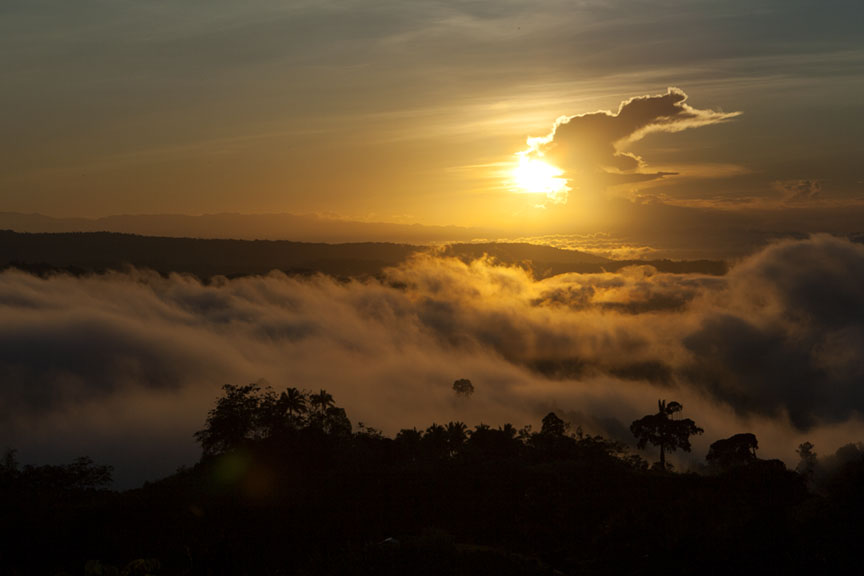DAVAO CITY (MindaNews / 16 March) – A resolution will be filed in the City Council on March 20 to create a task force that will investigate the sprouting of illegal mountain resorts in Marilog District, declared as the “new highland destination of the city,” in the 2013-2022 Comprehensive Land Use Plan (CLUP).
 Sunrise above the clouds in Davao City’s Marilog District. MindaNews file photo by BOBBY TIMONERA
Sunrise above the clouds in Davao City’s Marilog District. MindaNews file photo by BOBBY TIMONERA
Councilor Al Ryan Alejandre, chair of the tourism and beautification committee, told a press briefing on Thursday that of the 29 monitored establishments in Marilog, only two have business permits – Seagull Mountain Resort and Hill 88 Hideaway.
As photos of Marilog are making rounds on social media, Alejandre added that the City Treasurer’s Office alerted him that most of these establishments are not registered with the Business Bureau.
He assured that the local government would immediately take action on this issue, saying it is detrimental to the local economy for the revenue losses and to tourists as those illegal businesses, which continue to draw visitors, are located within the danger zones based on the terrain analysis of the Mines Geosciences Bureau (MGB) 11.
A subdivision developer is selling 2.3 hectares of land on social media even if it is within the ancestral domain in Marilog and without permission from the City Council, Alejandre revealed.
“I called them personally and they confirmed that they are selling,” he said.
He said the task force would be composed of officials from the Business Bureau, City Planning and Development Office, City Treasurer’s Office, City Engineer’s Office, Department of Environment and Natural Resources, National Commission on Indigenous Peoples (NCIP), and barangay officials.
Alejandre said the illegal businesses risk facing closure or demolition. He added he would like to see results of the investigation before taking legislative action.
He said they plan to conduct an inquiry to get the side of the resort owners. The lawmaker said he was disappointed that owners failed to secure business permits and take into account some provisions of CLUP, which allowed only a certain portion of Marilog for tourism-oriented businesses.
The CLUP stated that some 2,137 hectares, or 3.35 percent of Marilog’s 63,800.22 hectares, had been reclassified into tourism development zone from forestry.
Marilog is being positioned as the “new highland destination of the city” in the CLUP.
The CLUP said that of Marilog’s 12 barangays, Baganihan and Datu Salumay are the ones designated as tourism development zones.
Alejandre said they have yet to determine which among the highland resorts are constructed outside the tourism development zones.
Being considered as ancestral domain, Alejandre said the resorts in Marilog failed to secure consent from the tribal leaders.
Republic Act 8371, or the Indigenous Peoples’ Rights Act (IPRA), provides that projects that will affect indigenous peoples’ lands and resources require free and prior informed consent (FPIC) of the IPs or Lumads.
The IPRA recognizes the Lumads’ right to self-determination. The FPIC is intended to protect indigenous rights and interests and to give them a voice in matters that affect them, such as when investors come to undertake projects like mining, power generation, and plantations.
But even if the businesses are able to secure consent, Alejandre said they would not be issued business permits if they were located in the forest zone as identified in the CLUP, or within the identified danger zones.
“Some areas in Marilog are landslide-prone. Many resorts are in the danger zones. That’s too dangerous,” he said.
According to the CLUP, there are 24,613 hectares that fall within the ancestral domain of Obu-Manuvu and 24,382 hectares within the ancestral domain of Matigsalug-Manobo.
Alejandre said the city would crackdown on illegal businesses in Marilog, following the warning issued by President Rodrigo R. Duterte against establishments polluting the world-famous Boracay Island.
He said that although the city has no white sand beaches, they do not want “our mountains, where tourism industry is sprouting,” to suffer the same fate as Boracay.
The CLUP stated that the Marilog area would remain to be a major production area of high value crops, including, among others, durian, coffee, cacao, rubber, banana and coconut.
“Development of agri-forests will be encouraged to plant permanent crops in the area to help stabilize the slopes and prevent further soil erosion,” it added.
“The reforestation of the area through agro forestry enables the locals to earn income while enhancing the watershed,” the CLUP further said. (Antonio L. Colina IV / MindaNews)
